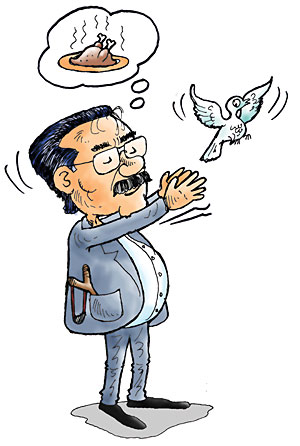 BILASH RAI |
At the time of writing, on Thursday morning, there has been no deal between the parties.
This has not been reported on enough but there are many non-Maoist forces � right-wing parties as well as sections of NC-UML � who do not want an extension. They believe the CA has been a source of strength and legitimacy for the Maoists and provided it access to state power. Any constitution prepared by this CA will therefore favour the agenda of the Maoists and marginalised groups. This school points out that if the objective of this process was to 'weaken and tame' the Maoists, and if that has not happened, what is the point of continuing with it? The more the Maoists hedge bets on extension, the happier this lot is.
But their options are now limited since the government has officially tabled the amendment proposal, shifting the onus onto the Maoists. The degree of Maoist flexibility will now be crucial since, contrary to rumours, it does not appear that Madhav Kumar Nepal will resign before an agreement on issues.
The debate on the CA within the Maoists is revealing. At the most recent central committee meeting, Kiran and company essentially said the CA has been hijacked by the 'reactionaries'; there was no point in staying on in the process; the party should prepare for the next stage of revolution, change its line and go back to armed conflict; anything else would be a betrayal.
What is striking about this view is there is absolutely no understanding of the existing ground reality, and no alternative plan. It is like, as left analyst Shyam Shrestha says, talking about an October revolution without even having prepared for the February revolution. Yet it finds a degree of support within for two reasons. One is the dogmatic indoctrination that binds many even now. The other is the need felt by many to keep up a 'revolutionary' image, especially when you know someone else will do the tough job of arguing a more considered line.
Prachanda's original paper considered traces of this thought, emphasising that the party is being pushed to a war and that the other side, prodded by India, is not interested in the process anymore.
He had however thought through some of the implications of not getting the CA extended. Arguing that it would break the political stagnation and lead to new alliances, Prachanda said that the party had not learnt how to fight the 'People's War' before it started it; it learnt on the job. Similarly, a new situation will arise in the absence of extension that the party can take advantage of. The organisation will remain intact; the framework of the peace process will remain as long as UNMIN is here; cadres will get a boost; the other side will face serious political and legal challenges; and the next few months could either prepare the ground for a new deal and thus 'revival of the CA' or be a period to prepare for the next confrontation.
It was left to Dr Baburam Bhattarai to talk about the achievements of the past few years, and that the core objective right now was to institutionalise the 'federal democratic republic' and other goals like social justice and inclusion. The CA was the platform to do it, and it was crucial to give it another chance. Letting it end would only embolden those groups who were opposed to these goals, even as the Maoists would be blamed for being 'anti-peace and anti-constitution'. While agreeing that they had to ask for the PM's resignation and not cave in unconditionally, Dr Bhattarai stressed the need to exercise 'maximum flexibility' � the line that prevailed ultimately.
How the Maoists play this at the end will be interesting. Conventional wisdom suggests they will give in unconditionally and couch it in terms of protecting the gains of war and the movement. But given the internal strains, and their feeling of being under siege, this will not be an easy decision. An unconditional extension by the Maoists cannot be taken for granted.
After this crisis is over, the Maoists should reflect on their internal fractures, lack of clarity, and lack of experience of open politics and how that has cost them dearly in the past year. They should also assess the balance of forces and recognise it is time to fulfill certain peace process commitments, especially on the PLA, and reframe strategy according to what is achievable and not achievable at the moment. Otherwise, even if there is an extension, both the party and the country will keep going round and round in circles.
READ ALSO:
Engage the monarchy, Biraj Bahadur Bista
Politics abhors a vacuum, Publisher's Note
Ready, steady, no?, Dewan Rai
Full circle FM, CK Lal
United we fall, Indu Nepal
Just questions, Ashutosh Tiwari
Two seconds to midnight, Ass
Whither constitution writing



